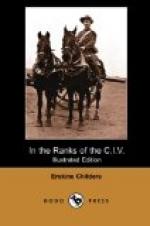It seems to be beyond doubt that our guns are a success, but their special ammunition is a source of great difficulty. We have stacks of it at Bloemfontein, but cannot carry much about with us, and of course the ammunition column with its fifteen-pounder shells is of no use to us. We have been short after every action, and have to depend on precarious waggonfuls, coming by convoy from somewhere on the railway. They say General Hunter and a division is concentrating here too, and a large force is visible in the valley, marching up. They are flooding us with fresh meat to-day, by way of a change. It is said that Paget has ordered a certain number of sheep and cattle to be slaughtered daily for the brigade.
(Later).—I had scarcely written the above lines when the order came to harness up at once. We did so, and were soon off; the sections separated, ours making for a steep hill about three miles away, on which we were ordered to take post. It was an awkward climb in the gathering darkness, with drag-ropes on the upper wheels, when moving along a very steep slope. A final rush of frantic collar work, and we were on a flat plateau, where we unlimbered the guns, so as to command the valley, and camped near them. I was on picket duty this night, and quite enjoyed it, though I had one three-hour spell at a go. It was warmer than usual, with a bonnie moon in a clear sky, a dozen veldt-fires reddening in the distance, mysterious mists wreathing about the valley beneath, and the glowing embers of a good wood-fire on which to cook myself some Maggi soup.
CHAPTER VII.
BULTFONTEIN.
July 9.—A delicious, warm day. Reveille at six. I am afraid it looks as if we were to be kept on this lonely hill-top for some time. It’s true we deserve a rest, for we have been on the move for some time; but I would much prefer to march on and see the last of De Wet. After campaigning, the routine of a standing camp seems dull and irksome. We have just shifted our camp a few hundred yards, bringing it to the very brow of the hill, which drops straight down into the valley. In fact, it is below the brow, and the horses are on a most awkward slant. The Munsters are camped just above us. Below, and about two miles away, lies Bethlehem, with hills behind it, and the mountain range mistily seen behind all. Unlike Lindley, this is the first time Bethlehem has been occupied by the British. Williams has just come in from a foraging expedition he was sent on. He got mealy flour for the battery, and a chicken for ourselves, and had had cigarettes and marmalade with the Lifeguards, who, with the whole of Hunter’s division, are camped near here. He also got some Kaffir bread from a kraal, a damp, heavy composition, which, however, is very good when fried in fat in thin slices. We ate our tea sitting on rocks overlooking the valley, and at dark a marvellous spectacle began for our entertainment,




